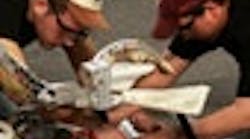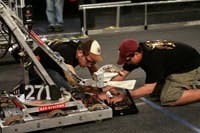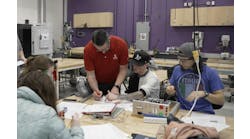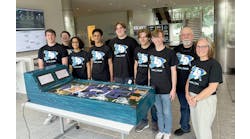By Mike Bacidore, managing editor
Who will have your job 20 years from now? At ControlDesign.com during the past few months, we’ve been asking you about the next generation of engineers. Where are they? How are they being encouraged and prepared for their future careers? As the Baby Boom generation begins its transition to retirement, when will the new breed step into those vacated shoes? What are they doing now in the way of training?
We began looking for incubation pockets of young engineers, speaking with machine builders and suppliers along the way, and one thing became clear very quickly—youngsters are not wanting for programs and organizations devoted to teaching and developing science, technology and specifically engineering skills in the work force of tomorrow.
In fact, so many curricula and groups appeared on our radar screen that we decided to spend some time looking individually at each one. But where to start? Which one would we cover first? The question itself begs the answer.
ENGINEERING ON THE FLOOR
High school students work on their entry during the FIRST Robotics Competition.
Photo by FIRST
FIRST—Science & Technology Heroes
“In high school, I was a mechanical team leader on the FIRST team in Southeastern Wisconsin from Arrowhead High School,” says Adam Czerwonka, a mechanical engineer at Woodward Governor in Rockford, Ill., where he also now is lead mentor/program coordinator for the Rockford Robotics team in the FIRST Robotics League. “The entire thing started when a friend of mine and I were looking to build a ‘battlebot’ and realized how expensive it was. Because our school didn’t have the money, we had to ask the presidents of companies to donate thousands of dollars for something they’d never heard of. We put together a PowerPoint presentation and went to some companies. We got the FIRST team started that way.”
FIRST, actually an acronym—for inspiration and recognition of science and technology—was founded in 1989 with just 28 teams. Based in New Hampshire, it has since expanded to 13,000 teams and cemented its footing on the international stage.
Children as young as 6 years old can participate in the Junior FIRST Lego League. They then graduate to FLL at age 9, before participating in the FIRST Tech Challenge and FIRST Robotics Competition at the high-school level.
“Our competitions encourage ‘coopetition,’” says Paul Gudonis, president of FIRST. “In your career you’ll have to collaborate with your joint-venture partners, your competitors and your suppliers. We’ve created a microcosm of that in the FIRST competitions. Nobody succeeds alone. It’s all about bringing a variety of skill sets together. There are the technical skills, whether it’s Autodesk software or doing C. We want this to be a sport of the mind where kids are as excited about this as they are about baseball or soccer.”
Has the program worked? According to results published in An Evaluation of the FIRST Robotics Competition, a study completed by Heller School for Social Policy and Management at Brandeis University (in which 55% of the respondents were non-white and 41% were female), 89% of FIRST participants went on to pursue a college education, and 41% of them declared an engineering major.
“I had never thought about engineering as a career before that,” admits Czerwonka, who graduated from the University of Minnesota in aerospace engineering and mechanics program after his FIRST experience. “Working with those mentors had a big impact on my thoughts of what I might do as a career. I knew I liked science, but that was a big influence on me picking engineering as a career. It really encompasses all of the fun aspects of engineering. Your mentors are pushing you.”
Like many former FIRST team members, Czerwonka now hopes that he can pass that enthusiasm on as a coach. “A lot of people have really been helped by this program and come back to help in the same way that I have,” he says. “Last year we had 13 kids on the team, and this year we’ll have 15 to 20 and six full-time mentors. About a third of our kids are home-schooled students. We have some students from the private high schools, but we are underrepresented by the public high schools. Once this team gets big enough we can start talking about getting more teams going.”
More Teams, More Time, More Money
“We’re showing the kids it’s more fun to design a video game than it is to play one,” says Rick Folea, CTO of Ricreations in Gainesville, Ga. In addition to running the company that he owns with his wife, Theresa, Folea is mentor of the Forsyth Alliance, a FIRST robotics team that includes the four high schools in Forsyth County, where he lives and works. It’s also an umbrella organization that manages and organizes all of these teams at the middle-school and elementary-school levels and runs the regional event for the FIRST Lego League.
“I remember the first year I found out our team captain had never picked up a tool before. Now he’s studying mechanical engineering at Georgia Tech. Every single kid who’s left this program has gone on to engineering in college. This year, the mechanical guys are building new chassis. The electronics guys are studying schematics and designing an LED board. We spend an inordinate amount of time with these kids in the labs. We always tie these things back into their school curriculum. When we tie it back, it all works.”
Folea initially discovered FIRST by coincidence, attending the national championships in Georgia two weeks after his 13-year-old son and a classmate helped to build a wired-control, 12-ft robotic arm for a class project that involved a simulated space shuttle mission. After dipping their toes in one of FIRST’s lower-level competitions, the new team decided to set its sights on the Robotics Competition. “You can’t run this program with less than $12,000,” explains Folea. “The last thing I wanted to do was start a fund-raising campaign for that kind of money, so we hit up major corporations. We sent an e-mail to AutomationDirect. They called and said they might be interested.”
Joan Welty, marketing team captain at AutomationDirect explains. “As we have become a larger company in the community we’ve looked for ways to participate. When Rick came to us with the proposal for sponsoring the FIRST team, we really saw it as a great opportunity to help our local community with a topic that’s very relevant to us and our industry.”
One of the side benefits of sponsoring the Forsyth Alliance has been in hiring team members as interns. “This past year we had five of the students performing valuable functions for us,” says Welty. “One of them was a test engineer for our new product development team. Another is into programming, and he developed an interactive product configurator for our PLC site. He did a project that’s been on our wish list for a few years, and he knocked it out in about eight weeks. We had another student who did a lot of video tutorial work for us. Everyone who worked with them was amazed.”
AutomationDirect, like many companies, finds FIRST to be a fitting partner because of the philosophies the company shares with the organization. The same goes for other corporate sponsors such as National Instruments and Rockwell Automation.
Taking the Mind by Storm
“On a personal level, a lot of our employees feel passionate about improving the trend that we’ve seen in the lack of interest in science and engineering,” says Andy Bell, K-12 academic program manager at National Instruments in Austin, Texas. “In 1997, we were introduced to Mindstorms and Lego by Chris Rogers at Tufts University. He was working on a project called Robolab, which took the Lego Mindstorms and applied it to an educational field. He was a big LabView programmer and fan, so he designed a software interface for the Mindstorms products based on LabView and he invented curricula. Then he talked to us to get permission.”
That’s when NI started talking with Lego, and a now monumental partnership was born.
“As things progressed, Lego was looking at updating its product and was looking at a software partner for the Lego Mindstorms,” explains Bell. “We developed the software, and now we have a multi-year roadmap with Lego. We are very involved with FIRST. We’re one of their partners. We are an international sponsor for the FIRST Lego League, we make a monetary contribution and we sponsor the Austin FIRST Lego League regional. We have mentors working in about 150 different classrooms in the local Austin area from elementary to middle school.”
NI also donates a copy of LabView to each of FIRST’s Robotics Competition teams and sponsors an event in Austin called Mindstorms Mania, which is a celebration of what the students have learned in the past year in their classrooms. To increase the visibility and celebrity of the program in the Austin area this year, the local ABC affiliate KVUE will broadcast the regional FLL event, complete with “sideline coverage” using sportscasters.
“It’s an all-day event,” says Bell. “But FIRST doesn’t want this to be competitive in a bad way. Gracious professionalism, one of FIRST’s prized aspirations, is a lot more than just lip service. Teams get points based on different acts that they do. For high school teams, if you go into the pits, you’ll see teams have mechanical malfunctions and other teams will offer help. It’s very team-building-oriented.”
Employee-Driven
“FIRST came to us primarily through our employees,” says Mary Lou Young, director—global community relations, at Rockwell Automation. “They wanted us to become more involved. Many of our employees’ children are FIRST. Children need to have a strong foundation in science, technology, engineering and math. There are so many good programs out there that we didn’t need to make our own. We did a lot of research to figure out which had the bandwidth we wanted. FIRST fit our model because they have an international component.”
Employees from Rockwell are involved as coaches, mentors, volunteers and judges in various FIRST programs. “Outside of FIRST, most teenagers aren’t that inspired to talk about what they’re doing,” says Young. “It’s thrilling to see them so excited about a program we’re involved in.”
Fifteen FIRST Robotics Competition teams, three Tech Challenge teams and 14 FLL teams fall under direct Rockwell Automation sponsorship, but the commitment only starts there. “Our total contribution to FIRST exceeds half a million dollars a year. It’s mandatory that we have employee involvement. For urban schools, we offer more funding because they often need buses and transportation.”
In each issue throughout 2008, we will look at a program or group that is helping to develop future engineers. From BEST Robotics to Project Lead The Way, from the Junior Engineering Technical Society to the National Robotics Challenge, from the Rube Goldberg Machine Contest to the American Society for Engineering Education, a plethora of organizations are making a difference in youngsters’ exposure to engineering and their decisions on educational and career choices.
If you are involved with or know of a competition, project or group that is encouraging or creating an engineering interest in tomorrow’s work force, let us know about it at at MBF

Leaders relevant to this article:




